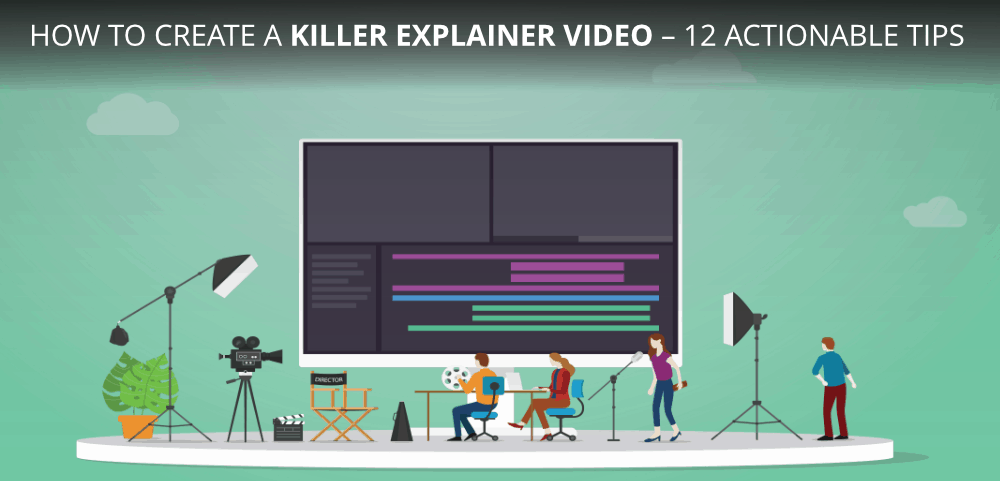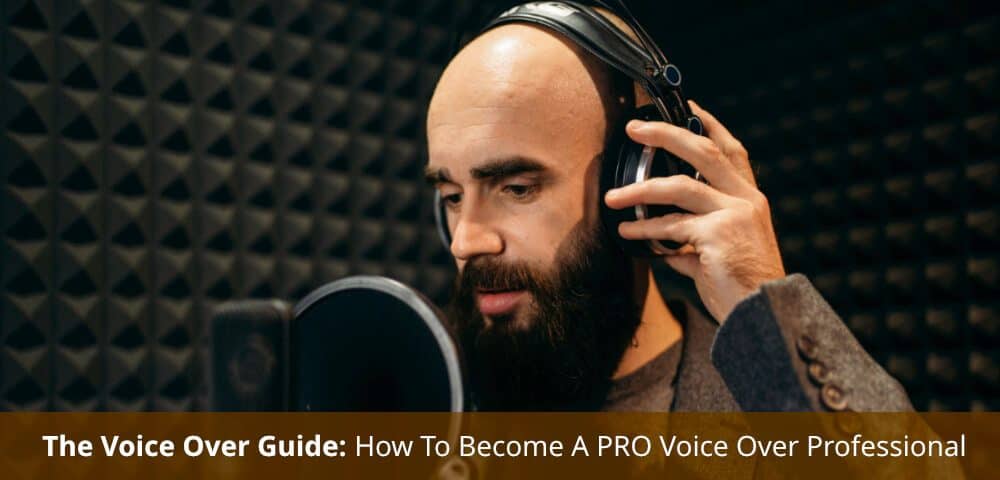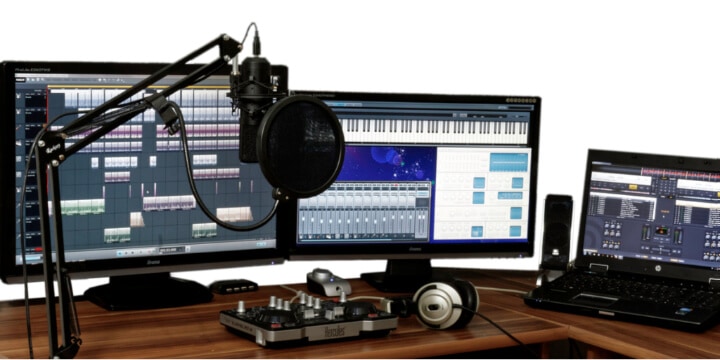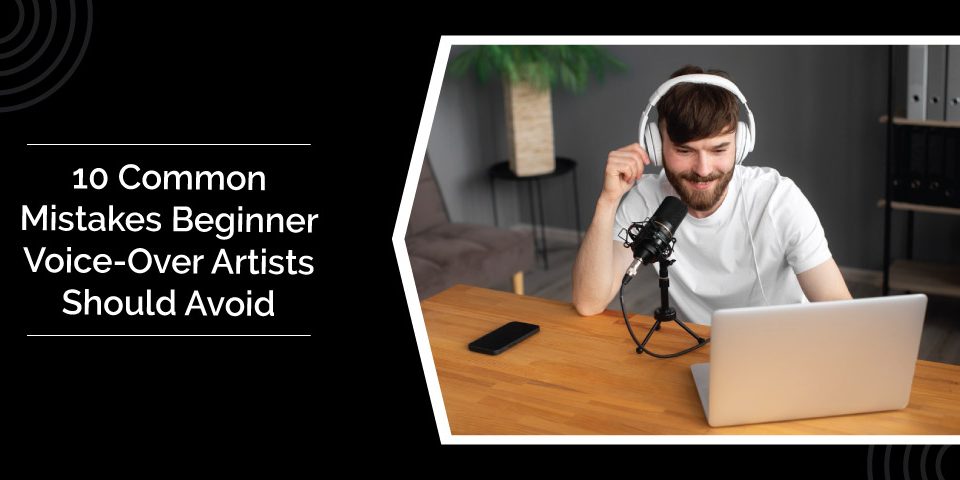
How To Create a Killer Explainer Video – 12 Actionable Tips
November 1, 2019
10+ Best Audiobook Apps
July 28, 2020Welcome to my voice over guide. You must be here because you want to make a career in voice over and want to become a voice over artist. Allow me to introduce myself, I am Peter Abraham, a voice over artist who became a professional voice over artist by chance.
After spending a chunk of my professional life working in the corporate sector, I found my true calling in voice-overs. With you taking interest in voice-overs, we are already off to a good start. I am sure I can help you find your place in the industry as well.
If you are new to the industry, I can tell you everything there is to know about voice over acting and voice-overs. If you are a professional, please bear with me as we go over a few basics, which professionals in our industry tend to forget. So, without further ado, let’s get started.
Contents
1] Why Your Voice Matters?
Your voice is just as unique as your fingerprints. We all have our own means of communicating and expressing ourselves with our voices. The human voice is the most personal form of communication, and that is exactly why voice-overs are sought-after. But what makes a good voice artist?
According to a report by WSJ, the sound of a voice over artist matters much more than the content itself. Wait a minute! Can you not be a good voice over artist if you don’t have a great voice? That is not true. The report by the Wall Street Journal is not talking about just about how your voice sounds, it’s talking about how you express yourself and your emotions. Your voice is more than just the natural qualities of it.
You may sound like say Morgan Freeman, but it’s pointless if you have zero convincing power or empathy. If you want to be successful in the voice over industry, you need to be able to connect with your audience. What would it take to make it big in the voice over business? It is a combination of various personal skills and voice over tools that you need to acquire. And what are those skills and tools? Read on to find out more…
2] Skills You Need to Be A Voice Actor
For professional voice-overs, it is not just your voice but also a combination of sound engineering, communication/business skills, and copy-reading skills. You need to be able to develop all of these to become a voice-over professional. Let’s break these skills down to see what exactly you need to learn.
I. Sound Engineering
No, you do not need to go grab a Bachelor’s degree in sound engineering. Neither can everyone become a sound engineer. Sound engineering is nothing but the ability to understand the minute details in audio. You need to develop an ear for perfection in audio to strike a balance.
You don’t need to become a professional sound engineer, but you do need to understand the basics and get them right every time. Voiceover recording is much more complex than cutting and pasting various clips to create content. Your voice should be punchy and convincing. It can be quite difficult to develop an ear for the “perfect” sound, but with practice, you will get it.
You will need to familiarize yourself with tools like noise gates, limiters, and compressors. The Internet has many wonderful and free resources to help you out. You can check out audio fundamentals resources online or even join a course to understand these tools and general audio concepts better.
II. Business and Communication Skills
So, you want to make it big in the voice-over industry? You need to learn the tricks of the trade if you want to succeed. The first thing you need to do is to research your market. The voice-over industry is different in every country.
Do you want to cater to local businesses? Do you want to work freelance internationally? What kind of content do you want to specialize in? These are all important questions that you should ask yourself.
Here are some of the things I learnt during my time as a voice actor:
- Be a thorough professional! You are being paid because you are a pro so act accordingly.
- Do not be afraid of feedback from your clients. Sometimes they can be harsh, but if there is a learning experience at hand, take it.
- Do not “sell”. Always work with your clients instead of working for them. You should always be offering your inputs to ensure you can put in your best.
- Do not imitate others. Try to think out-of-the-box and develop your own brand. The same applies to your work as well.
- Expose yourself to different cultures. There is plenty of information available online to learn from and it will make you a well-rounded voiceover artist.
III. Copy-reading
Copy-reading might sound like a straightforward skill, but it is not. When you set out to make a voice over demo for the first time, you will realize how difficult it can be. For voice actors, copy-reading has its own distinct style. There needs to be psychology in place, you need to understand the full context of the project to be able to take it up.
You should practice copy-reading in your free time. You can take improv classes if you want to, but there are plenty of online lessons available as well at popular e-learning websites if you don’t have access to great coaching locally. Try to practice hard-selling voice-overs at first, as they are much easier than content, which is more empathetic and personal.
Finally, you need to take care of your voice. Do not overstress yourself as your voice is what will enable you to become successful. You should never abuse your larynx. Try to retain your natural voice instead of developing an artificial persona.
3] Voice Over Tools
If you want to be a successful voice actor, you need to have the right equipment. I do not have my own studio so I hire out studio time from one of many in my city. Setting up a home studio is a lot easier these days with excellent technology from voice-over software to the right recording mic and of course a computer or laptop easily available for purchase. While there may be plenty of in-studio opportunities, you can can expect to work most of your projects at home (if you have your own set up). However, with digitalization, and the internet making life easier than ever before, you do not have to invest too much into equipment.
Here is what you need:
- A computer for software processing, communication, and website management.
- A stable internet connection.
- Audio recording equipment.
- A sound booth.
- Other accessories to make life easier, which include preamps, mixers, pop-filters, and more.
Everyone doesn’t have a large budget when starting out. But you should meet the standards expected of you. There is no room for any background noise in voice over projects. Everything needs to be squeaky clean, and your voice needs to be clear. This is where a sound booth comes in.
You don’t need to buy expensive soundproofing equipment but, if you want to put in the effort, you can build yourself a soundproof room. If you cannot afford expensive sound curtains, then simply put up blankets on your walls, and you should be fine. The end goal is to lock out all external noise.
For recording equipment, a decent microphone with a pop-filter is a must. Decent microphones do not cost a fortune, and you can find something to get yourself started for a reasonable amount of money. As long as you can deliver high-quality audio, that’s all that matters. But once you start earning enough money to upgrade, you should upgrade. The better your quality, the better voice over rates you can charge!
The best software for voice over can set you back by a fair bit. But you can start with something like Audacity which is a free audio editing software. These are open-source tools that offer more than enough functionality. If you are looking for a relatively inexpensive paid alternative, then Reaper is a great software which has a month long free trial period with all features available to use. If you want to get into high-end editing then the industry standards are Pro Tools, Logic, Nuendo, Cubase, they are the way to go but remember, for these, you will need to spend plenty of dough to acquire such licensed software for voice overs.
4] Voiceover Demos
With search engine optimization becoming more important than ever before, you can leverage your voiceover demos to make yourself marketable. If you expect yourself to be picked up by potential clients, you need to have the right demos for them. You should not create demos that would be less than acceptable to yourself. Always strive for good quality recordings with convincing pitches.
Here are some DON’Ts of voice over demos.
- Do not implement poetry, use simple language that connects with the audience.
- Don’t include statements of who you are and your career goals. Clients want to know what you can offer them, not who you are.
- Don’t create voice-over demos using shoddy equipment.
- Don’t be dishonest or misrepresent your work.
Also, you should create voice over demo scripts and go through them carefully before creating a demo.
5] How to Handle Voice Over Projects?
Here are some quick tips that you can follow when working on projects:
- Learn more about the project you receive. Do not shy away from asking questions. It is important to start with everything clarified. You don’t want to keep redoing your projects. Instead, you should get all the information necessary and do your best the first time around. This is especially true when creating an explainer video.
- After receiving all details, reiterate everything concisely via email or a phone call to ensure both you and your client are on the same page. You should also mention your payment terms at this stage to ensure you do not run into misunderstandings later.
- Sort out the technical details. Things like audio formats, time of delivery, if you need to deliver your work via snail mail, if you will work using a project-based app like Trello, etc.
- Send your initial takes and ask for feedback as early as possible. If you slack off, you are risking losing a potential client, as you will not be able to keep up with the deadlines if you are expected to make last-minute changes.
6] Pricing Your Work
Let me be clear with you, setting payment rates can be VERY difficult. Why you may ask? You will find clients who are looking to find the cheapest work possible, as well as clients with very high expectations, and no limits on how much they are willing to pay. You are your own CEO when it comes to the voice over industry, and you decide the work you take up.
Googling the best rates for voice over work will never work out for you as each professional’s situation is different. Sure, there are industry standards in each region, and you can start with that; but things like your equipment costs, the time you put into the project, etc matter as well.
You can also set rates for revisions if they are outside the scope of what was initially planned. However, if you make mistakes and do not follow instructions, you can’t expect to get paid for it. Here is everything that you should consider when setting your rates once you have a steady flow of work:
- Scope of work.
- Cost of equipment.
- All overhead costs (taxes, etc).
- Profit margin.
At the end of the day, anything in this world is sold as long as the client and the customer are agreeable to a price. What’s sustainable for you may not be sustainable for another voice over artist. You could also ask for a percentage of the project costs to cover your expenses for the project.
#Final Words
You need to put in the time to improve your craft and become better at what you do. With experience, you will get better as long as you learn from your failures. Competition is going to be fierce, but if you are ready to brave all odds, you will find success.
If you’re still wondering what are the reasons people would choose a voice over artist, check out our blog – Reasons To Use A Professional Voice Over For Your Explainer Video. Always strive for good quality recordings with convincing pitches while recording voice over commercials, explainer videos and so on.

Peter Abraham
Peter Abraham is a versatile voice-over artist based in Mumbai working in the voiceover industry since 2009. With a passion for storytelling and meticulous attention to detail in every project, he brings scripts to life with his captivating voice and professional delivery, exceeding client expectations. Whether it's a commercial or an audiobook, Peter specializes in a wide range of voice-over work, ensuring the highest quality.







